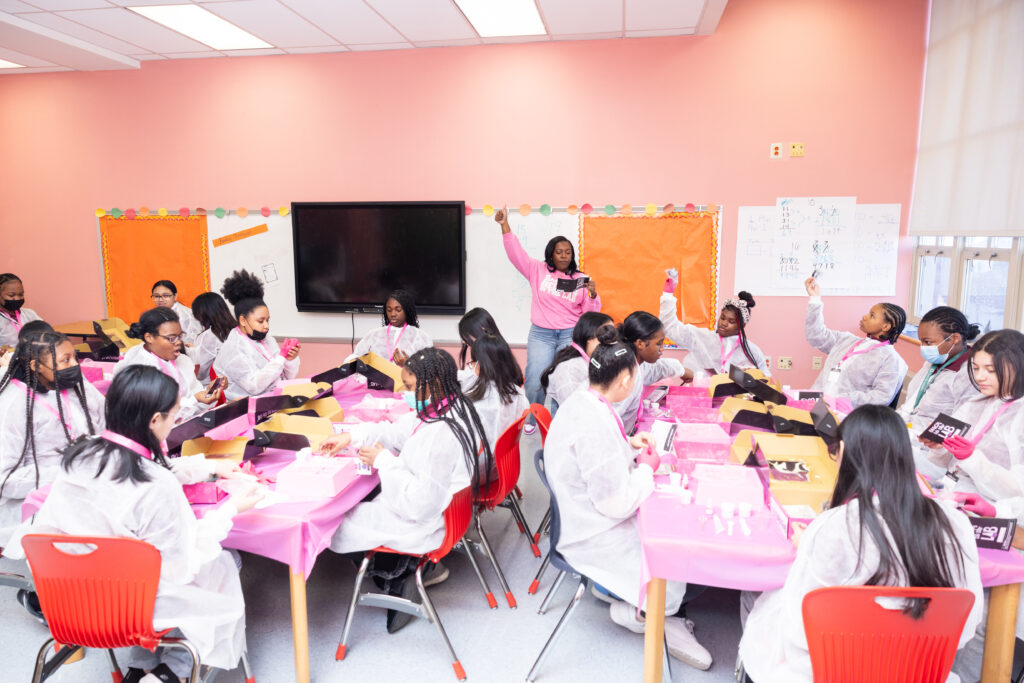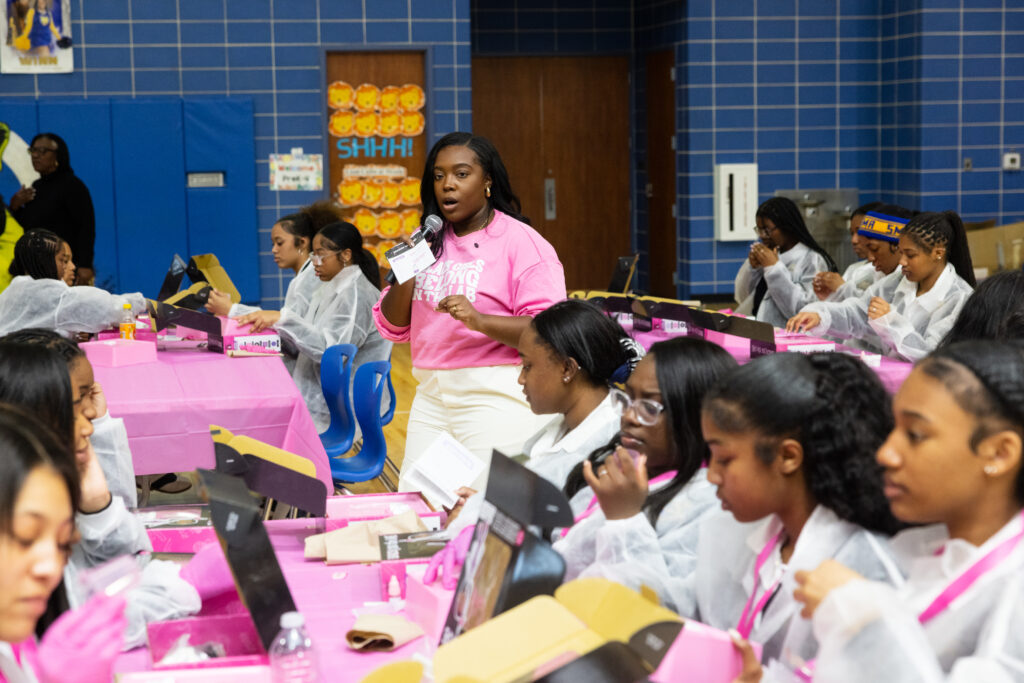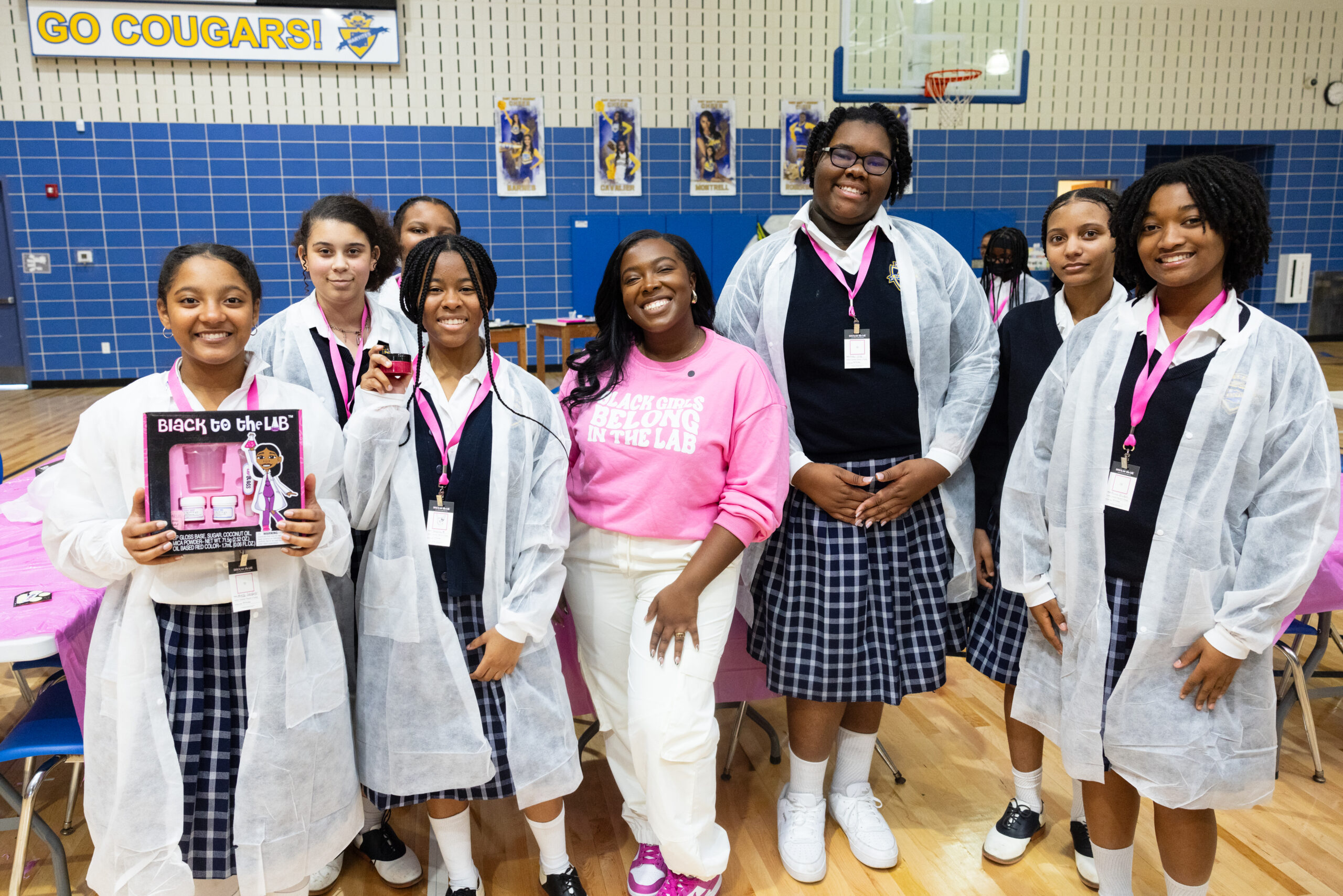Women make up only 34 percent of the workforce in science, technology, engineering and math (STEM). When you look at the percentage of Black women in STEM, the percentage drops drastically – to a mere 14.58 percent. While there have been many Black women trailblazers, there is a need for greater diversity in the field. Kristen Wells-Collins, founder of Black to the Lab, is working to diversify the industry by inspiring young girls to pursue careers in STEM.
Through Black to the Lab, a cosmetic chemistry set that gives Black girls access to real world applications of STEM, Wells-Collins combines play and learning. The hope is that by giving girls something identifiable to play with, that it will bridge the racial and gender gap in STEM learning.
“I felt led to create an educational product that exposes young girls to cosmetic chemistry and teaches them about how the beauty industry intersects with STEM,” Wells-Collins said. “I want young girls to see themselves not only as consumers, but also as producers.”
The Story Behind Black to the Lab

A few years after graduating college with her B.S. in chemistry, Wells-Collins began formulating plant-based beauty products. She recalled how the rise of the natural beauty movement inspired her.
“I didn’t realize I was able to easily create formulations because of my science background,” she said. “I had never heard much about cosmetic science or cosmetic chemistry as career path options.”
By this time, Wells-Collins was already working in the community space, with a focus on health and education initiatives for underserved populations. Her passion was to educate Black women about health and its many intersections.
“When I finally made the connection between science and beauty, I learned more about how underrepresented Black women are in the field,” she explained.
The Process of Creating Black to the Lab Kit

The journey to build the first Black to Lab kit began with a prototype that was first tested out at a little girl’s birthday party. The original activity kit includes general formulas for fan-favorite products like body scrub and lip gloss.
Wells-Collins emphasized the simplicity of the kits’ ingredients. This allows the students to learn at a basic level while still allowing them to imagine how to build a good formula from its foundation.
“We really wanted a retail-ready product,” she explained. “We partnered with a children’s toy manufacturer that had experience in STEM to learn about safety protocols, playing to learning concepts and more.”
Inside the cosmetic chemistry activity kits, you will find two introductory-level science experiments where youth learn how to create a lip gloss and body scrub. The activity kit includes supplies that mimic professional lab equipment such as lab badges, beakers, and syringes. Little girls can complete each activity along with a lab book with activity instructions, lab safety, thought-provoking questions, and an engaging game that exposes them to new, cosmetic chemistry-related vocabulary.
Connecting the Dots Between Science and Cosmetics
Black to the Lab was born out of necessity. When you look at the cosmetic chemistry industry, Black women make up less than 15 percent of the field. Yet, when you look at cosmetic sales, Black women are some of the top consumers. In 2022, Black consumers spent more than $7.4 billion on cosmetics and personal care products.
Even more shocking is that although 11% of all beauty customers are Black, Black beauty brands only represent 2.5 percent of the market.
“What I can do is be a part of the change by giving Black girls an opportunity to learn the STEM industry,” Wells-Collins said. “I hope our activity kits and activations allow Black girls to see themselves in the future and are the foundation for them to advocate for themselves in academia and in the beauty space.”
The Future of Black to the Lab
Since its inception, Black to the Lab has grown tremendously. Today, the kit is available on Amazon, and it has impacted more than 3,000 girls across the country. The Black to the Lab team has traveled and led students in its in-person learning experiences. The team has also established a scholarship fund for students who have a desire to study cosmetic chemistry.
Wells-Collins has also been featured in major publications, raised more than $70,000 in funding, and graced the TEDx stage. Coming soon is the new activity kit focused on agriculture and plant-based beauty, Rooted in Beauty, launching in the fall/winter 2024.
“What started as an idea in a tiny black box has blossomed into a brand that includes our cosmetic chemistry kits, vocabulary cards, seasonal apparel and three curriculums,” Wells-Collins said.
In the future, Wells-Collins would like to establish Black to the Lab as a leading provider of cosmetic chemistry educational resources for girls, particularly those in underrepresented communities. The goal is to develop comprehensive educational materials and activity kits, including digital learning platforms and interactive tools. The team is looking forward to forging strategic partnerships with industry stakeholders, including cosmetic companies, STEM organizations, and educational institutions.
“Ultimately, we want to prepare young girls to make an impact on what the future of the cosmetic chemistry industry looks like,” she said.
